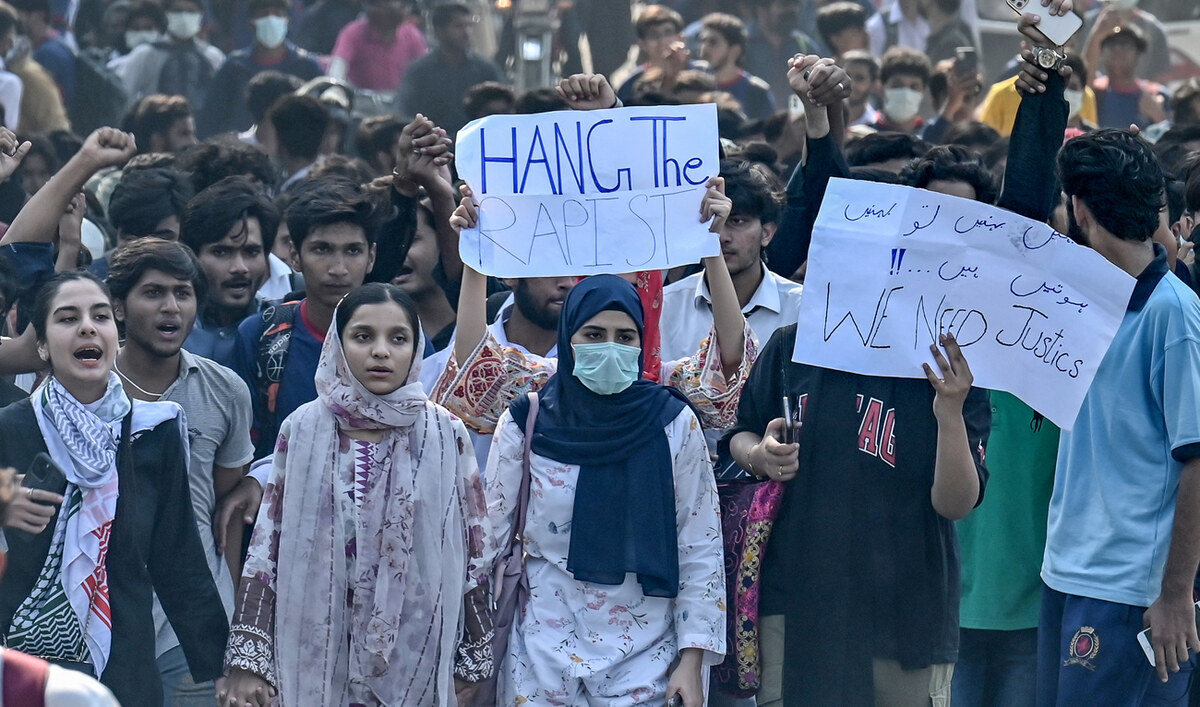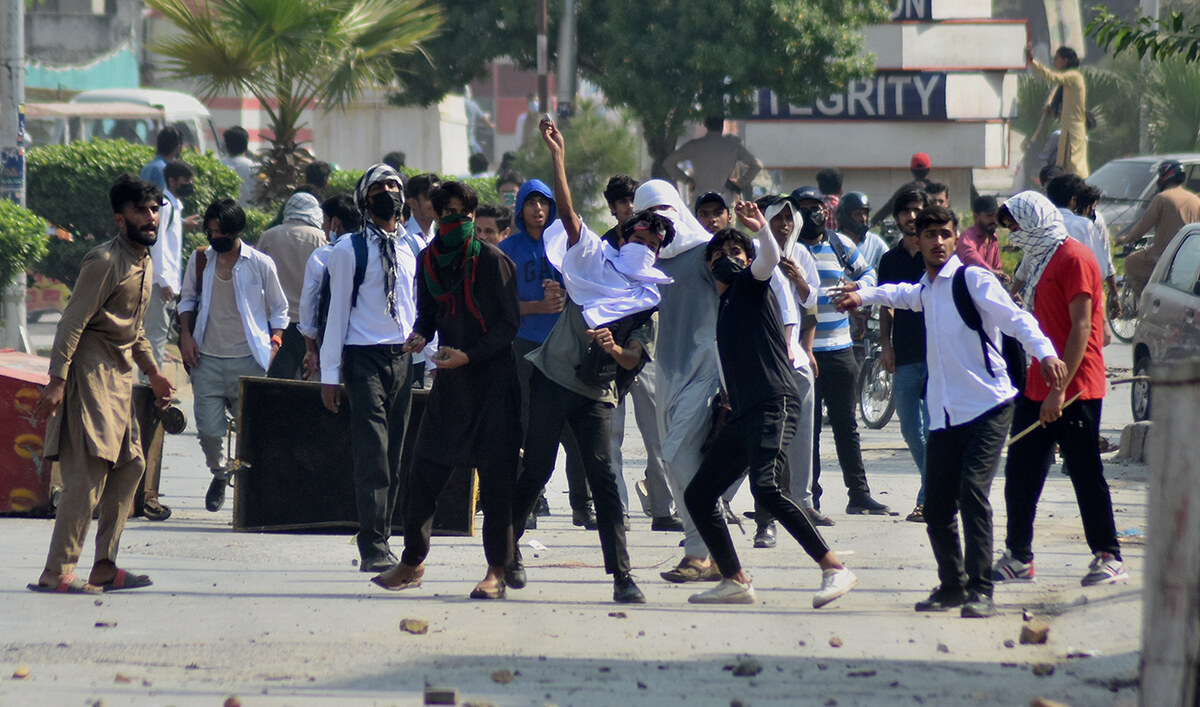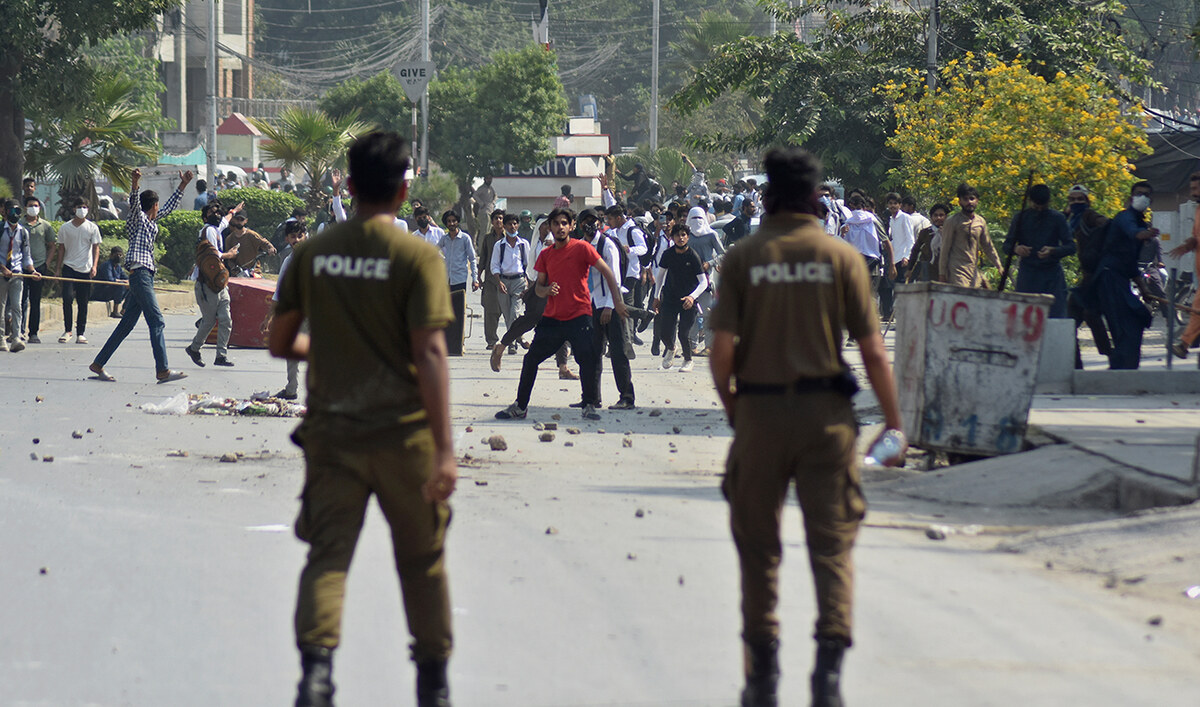ISLAMABAD: Pakistani security forces killed nine militants, including two suicide bombers and a high-value target, during an intelligence-based operation in the northwestern Khyber Pakhtunkhwa (KP) province, the military’s media wing, Inter-Services Public Relations (ISPR), said on Thursday.
Pakistan has seen a surge in militant attacks since its fragile truce with the Tehreek-e-Taliban Pakistan (TTP), or Pakistani Taliban, collapsed in November 2022. According to official data, over 82 policemen have been killed in attacks across KP since the beginning of the year.
The recent operation was carried out by Pakistani forces in Bajaur district following reports of the presence of militants involved in the killing of security personnel.
“During the conduct of the operation, own troops effectively engaged the Khwarij [militants’] location and after intense fire exchange, nine Khwarij including two suicide bombers and a high-value target Khwarij ring leader Said Muhammad aka Qureshi Ustad were sent to hell,” the ISPR said.
A large cache of weapons, ammunition and explosives was also recovered from the slain militants who remained involved in numerous “terrorist activities” against security forces and civilians, statement added.
It informed that a sanitization operation was being conducted to eliminate any other militants in the area while highlighting that security forces were determined to wipe out militancy from the country.
Security forces kill nine militants, including suicide bombers, in northwest Pakistan
https://arab.news/jsvx7
Security forces kill nine militants, including suicide bombers, in northwest Pakistan

- Militants were involved in several attacks on Pakistani officials and civilians, says the military’s media wing
- A ‘high-value target’ was also killed in the intelligence-based operation carried out in Bajaur district
‘Fake news’ of Pakistan rape ignites real protest movement

- Protests began this month after online posts alleged Lahore college student had been raped by staffer
- Student protests broke out over allegations, with police arresting over 380 after clashes and unrest
LAHORE, Pakistan: For Pakistani police, reports of a college campus rape that went viral this month are “fake news” fomenting unrest. For protesting students, the social media posts offer a rare public reckoning with sexual assault.
But as the clashing accounts have spilled from the Internet and onto the streets, both sides agree the case has ignited a tinderbox of legitimate fears.
“Girls who go to campuses definitely feel threatened,” 21-year-old Khadija Shabbir told AFP at a Monday protest in eastern Lahore city that was swiftly dismantled by authorities.
Senior officer Syeda Shehrbano Naqvi is charged with probing the case police insist has been conjured from unverifiable online rumors.

But she admits it has struck a real chord on the issue of harassment in Pakistan, a patriarchal country where open discussion of abuse is taboo.
“All of us somewhere have experienced it,” she says. “It’s an extremely sensitive subject.”
It began earlier this month with a swirl of social media posts alleging a staff member had raped a woman in the basement of a Punjab College campus in Lahore.
When police and local media were unable to trace a victim, the local government and school administration dismissed the claims as a hoax.
But student protests broke out last Monday, escalating into unrest in Lahore and other cities later in the week that led to the arrests of at least 380 people over vandalism and arson.

Educational institutes were shut across Punjab province last Friday — when protests are generally staged after prayers — and political gatherings were banned for two days, although officials gave no reason.
As a result, about 26 million children were out of school as well as many more university and college students in the country’s most populous province.
But students, banned from officially organizing in unions for the past four decades, have continued to come out this week.
“I haven’t seen it grow into a movement like this or this sort of anger or reaction from them before,” said Fatima Razzaq, a member of the Aurat March women’s rights group.
The Punjab government has a women-only police emergency line where they report receiving 1,300 calls daily from women concerned about their safety.
But with 80 percent of women saying they have been harassed in public places, according to the UN, there is little trust that authorities take the matter seriously.
Razzaq said “a deep-rooted frustration” is surfacing as a result.
While protesters’ opinions vary about the veracity of the rape claim that has sparked the movement, many cite their own experience as more pivotal in their decision to turn out.

“A girl I know in my university committed suicide because she was being harassed,” student Amna Nazar told AFP.
“My professor keeps asking me out and calling me to his office,” said another University of the Punjab student, asking to remain anonymous. “This is something I do not want to do.”
On the campus where the crime is alleged to have happened, activists painted the walls with red hand prints and demands of “justice for the rape victim.” But it was quickly painted over.
“If we go and complain about an incident, we are told that nothing happened and we should stop talking about it,” said one female student at another university.
Lahore’s High Court has announced a new committee of judges to investigate campus sexual harassment, indicating authorities are conceding the protests have a point.
But the face-off between students and police is taking place amid a broader crackdown on dissent from political and ethnic activists across Pakistan.
Student social media pages and online chat groups created to mobilize protesters have disappeared and officials have pledged that those spreading misinformation will be prosecuted.

Naqvi — the police officer — said there was “less tendency of people to believe somebody in uniform” and that the confrontation had spiraled into the “state versus the students.”
Meanwhile, the women whose experiences with harassment have placed them at the center of the movement are finding themselves sidelined as the protests spill into violence often led by men.
As crowds of male students threw rocks at police in the city of Rawalpindi last week, officers returned fire with rubber bullets, and women fearing for their safety cowered away in side-streets.
Nevertheless, 19-year-old female student Inshai said: “We are standing up for our rights.”
Pakistan formally requests IMF RST money, targeting $1 bln, finance minister says

- Created in 2022, RST provides long-term concessional cash for climate-related spending
- Pakistan is one of the most vulnerable countries to climate change, as per Global Climate Risk Index
WASHINGTON: Pakistan is targeting around $1 billion in a formal request for funding from the IMF facility that helps low and middle-income countries manage external shocks, its finance minister told Reuters.
“We have formally requested to be considered for this facility,” Finance Minister Muhammad Aurangzeb said in an interview on the sidelines of the IMF/World Bank autumn meetings in Washington.
The International Monetary Fund had already agreed a $7 billion bailout for Pakistan, but has further funding available via its Resilience and Sustainability Trust (RST).
The RST, created in 2022, provides long-term concessional cash for climate-related spending, such as adaptation and transitioning to cleaner energy.
The South Asian nation is one of the most vulnerable countries to climate change according to the Global Climate Risk Index.
Floods in 2022, which scientists said was aggravated by global warming, affected at least 33 million people and killed more than 1,700. The country’s economic struggles and high debt burden impinged its ability to respond to the disaster.
Pakistan is also in talks with the Asian Infrastructure Investment Bank for a credit enhancement for a planned Panda bond, with an initial issue of $200-250 million, Aurangzeb said.
A Panda bond issuance would be Pakistan’s first foray into China’s capital markets. Aurangzeb said they were talking to “a few other institutions” in addition to the AIIB for a credit enhancement.
Issuing in the world’s “second largest and the second deepest” capital market, Aurangzeb said, was the key aim, rather than a particular issuance size.
“From our perspective it is diversification of the funding base,” Aurangzeb. “Even if the inaugural issue is not significant in size, for us it is important that we print that and of course then we can keep it on tap.”
Pakistan, Saudi Arabia vow to increase cooperation between small and medium enterprises

- Pakistan’s minister for industries and production is in Saudi Arabia to attend two-day UN industrial policy forum
- Both sides discuss matters of mutual interest, agree to increase visits by business professionals to their countries
ISLAMABAD: Pakistan’s Minister for Industries and Production Rana Tanveer Hussain and Saudi Arabia’s governor for small and medium enterprises (SME) general on Thursday agreed to enhance cooperation between the two countries in the SME sector.
Hussain departed for the Kingdom this week to attend the two-day United Nations Multilateral Industrial Policy Forum (MIPF) being held in Riyadh from Oct. 23-24.
The Pakistani minister engaged with international delegates to discuss strategies for enhancing industrial growth and sustainable practices during his visit. On Thursday, he met Saudi Arabia’s governor for small and medium enterprises general in Riyadh, Pakistan’s ministry of industries and production said.
“Both sides discussed matters of mutual interest,” the statement said. “Cooperation among small and medium enterprises will be increased.”
The ministry said both sides also agreed to increase the number of visits by business professionals to their countries.
Pakistan has been seeking to strengthen trade and investment ties, particularly with the Kingdom, whose leadership reaffirmed its commitment this year to expedite a $5 billion investment package for the South Asian country.
Sajid takes six as England dismissed for 267 in third Test

- Sajid Khan finishes with 6-128 as Noman Ali grabs 3-88 to skittle England on spin-friendly track
- Both teams have three spinners on grassless pitch which hosts dried with fans and heaters
RAWALPINDI: Pakistan spinner Sajid Khan took six wickets as England were all out for 267 after electing to bat on the opening day of the series-deciding third Test in Rawalpindi on Thursday.
Sajid finished with 6-128 and Noman Ali grabbed 3-88 after a rearguard 89 by Jamie Smith enabled England to get past 250 after they stuttered to 110-5 at lunch.
Smith smashed six towering sixes and five boundaries in his 119-ball knock before he was caught off a miscued slog against spinner Zahid Mahmood in the last over before tea.
After tea, Sajid removed Rehan Ahmed for nine to complete his third five-wicket haul before also dismissing Jack Leach for 16.
England lost captain Ben Stokes in the third over after the break, caught Sajid for 12 but Smith, who reached his fifty off 94 balls, and Gus Atkinson (39) added 105 for the seventh wicket.
The morning session was dominated by Sajid and Noman Ali who bowled unchanged for 42 overs.
After England won the toss and batted, Pakistan gave the new ball to Sajid and Noman who benefited from the parched pitch offering spin and low bounce from the first ball.
Zak Crawley and Ben Duckett raced to 56 in a confident start but England lost Crawley (29), Ollie Pope (three) and Joe Root (five) in the space of just 24 runs.
Noman had Crawley caught off a miscued drive while Sajid removed Pope and Root leg before.
Duckett, who completed a half-century off 76 balls, was trapped leg before by Noman for 52 after hitting four boundaries and a six.
First Test triple centurion Harry Brook lasted for 14 deliveries before being bowled behind his legs by Sajid for five after he failed to connect on a sweep.
Both the teams included three spinners on a grassless pitch which the hosts dried with fans and heaters in the build-up.
Sajid and Noman shared all 20 wickets in Pakistan’s second Test win to level the series at 1-1 after England won the first by an innings, with both matches taking place in Multan.
‘No formal meeting’ held between Pakistan and India at SCO summit, says foreign office

- Foreign office spokesperson says the deputy PM only exchanged ‘pleasantries’ with Indian minister
- India’s Subramanyam Jaishankar was the first senior official from Delhi to visit Pakistan after a decade
ISLAMABAD: Pakistan’s Deputy Prime Minister Ishaq Dar did not hold a formal meeting with Indian External Affairs Minister Subrahmanyam Jaishankar at the Shanghai Cooperation Organization Summit (SCO), the foreign office clarified Thursday, saying that viral images of the two officials seated together at a luncheon were simply an exchange of pleasantries.
Nuclear-armed India and Pakistan are bitter adversaries with longstanding political tensions, having fought three wars and numerous skirmishes since they were carved out of the subcontinent’s partition in 1947.
The Indian minister was the first top official from New Delhi to visit Pakistan after nearly a decade. During the visit, a picture of Dar and Jaishankar was shared by media outlets, where the two ministers could be seen engaged in a conversation while sharing a seat next to each other at the official SCO lunch.
This led to speculations and conjectures by political analysts, with some saying the two officials were discussing cricket and trying to break the ice between the arch-rival neighbors.
“There has been no formal meeting between Pakistan and India at the foreign minister’s level including at the SCO,” foreign office spokesperson Mumtaz Zahra Baloch said on Thursday.
She said it was common for delegations in multilateral settings to “exchange pleasantries” and hold informal conversations over lunch and dinner, especially between the hosts and participating guests.
Relations between India and Pakistan have been particularly sour since 2019 when Indian Prime Minister Narendra Modi revoked the limited autonomy of Indian-administered Kashmir. The move was celebrated across India but led Pakistan to suspend bilateral trade and downgrade diplomatic ties with New Delhi.
Kashmir is divided between India and Pakistan but claimed by both in full.
Before departing Pakistan, Jaishankar thanked Prime Minister Shehbaz Sharif, Deputy PM Dar and the Pakistan government for the “hospitalities and courtesies” extended to him during the visit.
Pakistan’s Information Minister Ataullah Tarar said that none of the two countries requested a bilateral meeting, though he termed the Indian minister’s presence at the SCO as an “ice breaker.”












